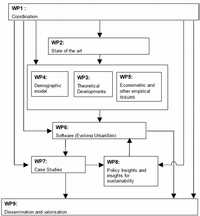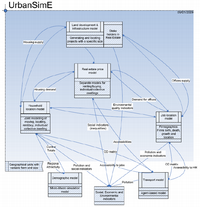|
|||||||||||
Research
Increasing concerns about sustainable development and the growth of urban areas have brought forth in recent years a renewed enthusiasm and need for the use of quantitative models in the field of transportation and spatial planning. This project will improve urban simulation models and their interaction with transport models. Unified operational models that favour a microscopic approach, such as UrbanSim and ILUTE (Integrated Land Use, Transportation, and Environment Modelling System) have recently gained a lot of interest both in the land use and transport communities. Nevertheless, in their current forms these models still require further development to support a comprehensive analysis of the main environmental and socio-economic questions of the sustainability of urban growth and the relevant public policies.
The goal of this project is to address the modeling and computational issues of integrating modern mobility simulations with the latest micro-simulation land use models. The project will advance the state-of-the-art in the field of the microsimulation of prospective integrated models of Land-Use and Transport (LUTI). On the modelling side, the main challenges are to integrate a demographic evolution module, to add an environmental module, to improve the overall consistency and, last but not least, to deal with the multi-scale aspects of the problem: several time horizons and spatial resolutions are involved.
Theoretical models (such as the monocentric textbook model) have proven useful in stating normative results, but remain of limited usefulness, when it comes to empirical applications that include any degree of disaggregation. However, they are useful benchmarks. Simulation tools are more suitable for dealing with realistic policy analysis. Integrated urban modelling is still a complex task and developing a complete and reliable tool remains out of reach of many professional organizations. The Open Platform for Urban Simulation (OPUS), is an Open Source modelling platform for a suite of behavioural-based models addressing (housing location decisions, employment decisions, and urban form). UrbanSim is an integrated model system implemented within the OPUS Platform.
UrbanSim has proved to be a very powerful and efficient tool in the context of American cities (Waddell et al, 2007, Waddell and Borning, 2004). However, various recent projects conducted in Europe (see below) point to the need to adapt the available modelling platform, to develop new tools consistent with the historical, political and social characteristics of European cities and with specific lifestyles and preferences. High-level academic research in transportation, planning, economics and in econometric modelling and in other fields such as geography, new economic geography, computer science and operations research happen to be particularly relevant for analysing urban development and building integrated land use and transportation models. These developments will aim at:
- Improving the integrated urban model specification, estimation and validation (and therefore the accuracy of predictions),
- Adapting UrbanSim to European contexts,
- Adding to UrbanSim the simulation of travel and daily behaviour,
- Adding to UrbanSim a sustainability and environmental module,
- Adding a demographic micro-simulation module to the integrated platform,
- Introducing some elements of collective decision process within households (taking into account potential conflicts of interests among different members of a household).
These developments will be analysed, tested and validated for three case studies in Europe. We promote this new prototype modelling platform UrbanSimE for Europe among the professional and academic communities in order to ease its application by European local and regional communities.
Wichtiger Hinweis:
Diese Website wird in älteren Versionen von Netscape ohne
graphische Elemente dargestellt. Die Funktionalität der
Website ist aber trotzdem gewährleistet. Wenn Sie diese
Website regelmässig benutzen, empfehlen wir Ihnen, auf
Ihrem Computer einen aktuellen Browser zu installieren. Weitere
Informationen finden Sie auf
folgender
Seite.
Important Note:
The content in this site is accessible to any browser or
Internet device, however, some graphics will display correctly
only in the newer versions of Netscape. To get the most out of
our site we suggest you upgrade to a newer browser.
More
information


